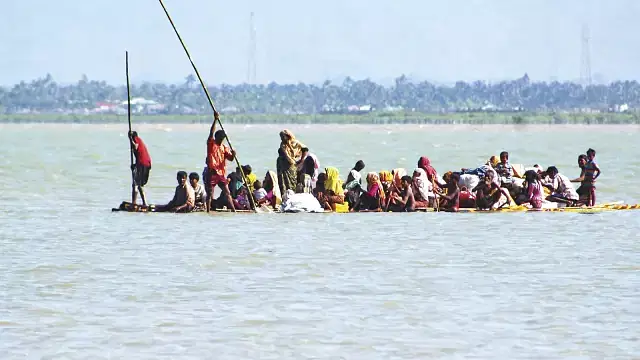
Two trawlers carrying a few hundred Rohingyas, including children, have been adrift at sea, not being able to halt at any shore in the Bay of Bengal and the Andaman Sea. The European Union has called upon countries of the region to rescue these Rohingyas and provide them with safety and shelter.
This appeal was made in a joint statement issued on Friday by the EU high representative and vice president Josep Borrell and commissioner Janez Lenarcic from the EU headquarters in Brussels. The EU Delegation in Dhaka released the statement on Saturday.
The UN human rights high commissioner Michelle Bachelet recently sent a letter to the Bangladesh foreign minister AK Abdul Momen to give shelter to the Rohingyas who had been floating around in two trawlers for two weeks. The UK minister of state for foreign affairs Lord Ahmad made the same appeal over phone to the foreign minister.
Foreign minister AK Abdul Momen, reacting to the appeal, said around 500 Rohingyas are adrift in two trawlers in the Bay of Bengal and Andaman Sea. The Malaysian government refused to take them in and so they are now trying to enter Bangladesh. They are not in Bangladesh’s waters now and Bangladesh has no obligation to take them in. Other countries can come ahead to help too. Malaysia, Indonesia, Thailand, India and many other countries are in the region. He asked, why is only Bangladesh being requested to take them in?
In their joint statement, the senior EU officials Josep Borrell and Janez Lenarcic praised Bangladesh’s generous and humanitarian role is providing shelter to over 400 Rohingyas on 26 April. They said they hoped the countries of the region would follow this example.
The international community has asked us to take responsibility of the Rohingyas who are at sea. They went to the sea because of Myanmar, yet the international community isn’t holding Myanmar responsible or asking them to take the Rohingyas back.
These EU officials called upon all armed groups in Myanmar to implement the peace process through an unconditional truce. That would resolve the main problems of the Rohingyas. The EU, as humanitarian and development partner for the Rohingya refugees in Bangladesh, was prepared to provide further assistance to the region. They said that they would continue to encourage a safe, sustainable, dignified and voluntary return of the Rohingyas to their homeland. They would also continue the process to ensure full accountability of those responsible for the crimes against the Rohingya.
Shahidul Huq said that in deciding what to do about the Rohingyas who were at sea, the decisions of the International Criminal Court (ICC) and the International Court of Justice (ICJ) should be taken into cognizance. Eventually Bangladesh will have to take a logical and feasible stand about these over 500 Rohingyas.
Diplomatic sources and local sources at Cox’s Bazar on Friday said that the two trawlers had tried to enter Bangladesh’s waters on 23 April, but were obstructed by the law enforcement. The trawlers are now located near St Martin’s in Myanmar waters.
Director of Dhaka University’s Centre for Genocide Studies (CGS) Imtiaz Ahmed told Prothom Alo, “The international community has asked us to take responsibility of the Rohingyas who are at sea. They went to the sea because of Myanmar, yet the international community isn’t holding Myanmar responsible or asking them to take the Rohingyas back.”
Imtiaz Ahmed went on to say, “I heard one of the trawlers is in the Andaman Sea. If that is so, then the question of India’s responsibility comes forward. EU has said that the regional countries must take responsibility. That means in the present situation, the moral duty of India and all the other countries of the region too has been brought forward.”
He said that the EU statement has called upon the armed groups in Myanmar to unconditionally go for ceasefire. Yet the ICJ ruling clearly states that peace stability must be ensured in Rakhine. There is no reason for the EU not to understand that Myanmar has failed to maintain stability in Rakhine and has violated the court orders.









